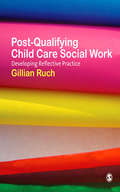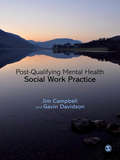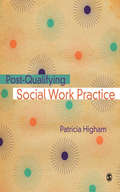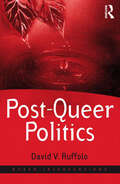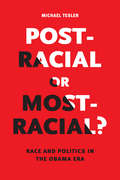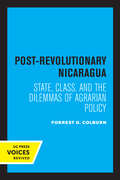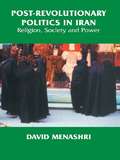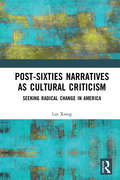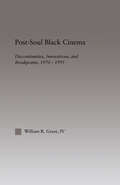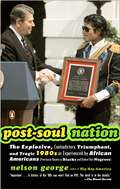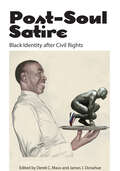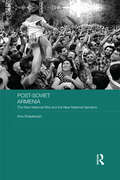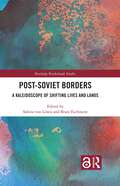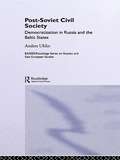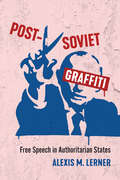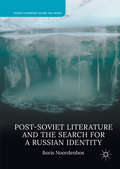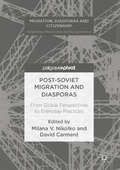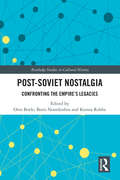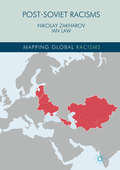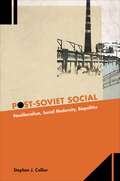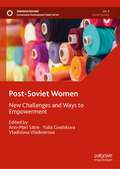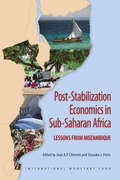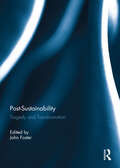- Table View
- List View
Post-Qualifying Child Care Social Work: Developing Reflective Practice
by Dr Gillian Ruch`The first text to systematically address the learning needs of post-qualifying child care social workers. Soundly organized and engagingly written with useful summaries and reflective exercises for students, it is a very fine text that will be widely used' - Nick Pike, Principal Lecturer in Social Work, University of Gloucestershire This textbook provides an overview of the Post Qualifying Child Care Award in social work. Written in response to recent policy and training guidelines, it provides the underpinning knowledge for candidates following the Post Qualifying curriculum. It helps child care social workers acquire and develop the breadth of knowledge and understanding that characterise best practice. Key features include: - Chapters on reflective collaborative and critical practice; child development; child observation; case management and managing risk; working in partnership with children and families; inter-professional working and practice education - Links to the relevant post qualifying standards for social work - Contributions from a team of practice assessors and programme candidates - A practice-based approach - clearly links theory, research and practice - An inter-professional perspective - Case studies, activities and points for reflection that encourage the reader to develop ways of challenging and improving their own practice. The book equips social workers with the relevant training, knowledge and skills to improve the quality of services and their delivery. With an emphasis upon continuing professional development, this text is suitable for social workers studying for the Child Care Award, those already in practice and other social care professionals working with children.
Post-Qualifying Mental Health Social Work Practice
by Gavin Davidson Dr Jim CampbellSocial workers and other professionals working in the area of mental health often face complex and difficult practice dilemmas shaped by increasingly demanding policy and legal contexts across the UK. Jim Campbell and Gavin Davidson focus on the post-qualifying role played by mental health social workers in this book. The authors draw on theoretical and research perspectives on the subject, before outlining how professionals can achieve best practice. Topics covered include: " Models of mental health and illness " Discrimination and social exclusion " Addressing service user needs " Carer perspectives " Working with individuals, families and communities The chapters are accompanied by exercises, which encourage readers to critically reflect on their own professional and personal experiences. Case studies are also included, so that students can reappraise the knowledge they have learned in the text. The book will be essential reading for social work practitioners taking postgraduate courses in mental health and for those training to become Approved Mental Health Professionals.
Post-Qualifying Social Work Practice
by Patricia Higham"A valuable resource for all those engaged in post-qualifying social work practice, … It is impressive in its coverage of contemporary social work practice across the four countries of the UK" Professor Jackie Powell, University of Southampton "The PQ landscape is complex and changing fast, so the reader will be grateful to Pat Higham and her colleagues for this clear and comprehensive analysis of PQ" Professor Mark Doel, Sheffield Hallam University. " a comprehensive introduction to social work education at post-qualifying level. It identifies the key issues qualified social workers need to consider in contemporary practice and enables them to engage in critical reflection through the development of their post-qualifying expertise." Professor John Harris, University of Warwick This core textbook provides an authoritative overview of the post-qualifying awards in social work. Written in response to recent policy and training guidelines, the book will enhance social workers′ post-qualifying knowledge, skills and values within specialist areas of practice. The book will: - Use critical self-appraisal to construct different ways of thinking about and doing social work - Encourage reflection on their practice - Enable social workers to build confidence in their professional identity - Move from competence to increased capability and to expertise - Help social workers to explore values dilemmas - Increase social workers′ knowledge for practice - Promote learning and career development. This book examines core assumptions about post qualifying practice - that values and relationships (including partnerships with service users) are essential to good practice, that social workers will work in diverse organisational structures and that social workers in the United Kingdom should become aware of European models of social work.
Post-Queer Politics (Queer Interventions)
by David V. RuffoloIn Post-Queer Politics, Ruffolo looks at the work of Foucault, Butler, Bakhtin, Deleuze, Guattari and others in his creative refocus on the queer/heteronormative dyad that has largely consumed queer studies and contemporary politics. He offers a radical and intersectional new way of thinking about class, race, sex, gender, sexuality and ability that extends beyond queer studies to be truly transdisciplinary in its focus and political implications. It will appeal to readers across a range of subjects, including gender and sexuality studies, philosophy, cultural studies, political science, and education.
Post-Racial or Most-Racial?: Race and Politics in the Obama Era
by Michael TeslerWhen Barack Obama won the presidency, many posited that we were entering into a post-racial period in American politics. Regrettably, the reality hasn’t lived up to that expectation. Instead, Americans’ political beliefs have become significantly more polarized by racial considerations than they had been before Obama’s presidency—in spite of his administration’s considerable efforts to neutralize the political impact of race. Michael Tesler shows how, in the years that followed the 2008 election—a presidential election more polarized by racial attitudes than any other in modern times—racial considerations have come increasingly to influence many aspects of political decision making. These range from people’s evaluations of prominent politicians and the parties to issues seemingly unrelated to race like assessments of public policy or objective economic conditions. Some people even displayed more positive feelings toward Obama’s dog, Bo, when they were told he belonged to Ted Kennedy. More broadly, Tesler argues that the rapidly intensifying influence of race in American politics is driving the polarizing partisan divide and the vitriolic atmosphere that has come to characterize American politics. One of the most important books on American racial politics in recent years, Post-Racial or Most-Racial? is required reading for anyone wishing to understand what has happened in the United States during Obama’s presidency and how it might shape the country long after he leaves office.
Post-Revolutionary Chicana Literature: Memoir, Folklore and Fiction of the Border, 1900–1950 (Latino Communities: Emerging Voices - Political, Social, Cultural and Legal Issues)
by Sam LopezThis book examines how Chicana literature in three genres—memoir, folklore, and fiction—arose at the turn of the twentieth century in the borderlands of the United States and Mexico. Lopez examines three women writers and highlights their contributions to Chicana writing in its earliest years as well as their contributions to the genres in which they wrote. The women -- Leonor Villegas de Magnón, Jovita Idar, and Josefina Niggli—represent three powerful voices from which to gain a clearer understanding of women’s lives and struggles during and after the Mexican Revolution and also, offer surprising insights into women’s active roles in border life and the revolution itself. Readers are encouraged to rethink Chicana lives, and expand their ideas of "Chicana" from a subset of the Chicano Movement of the 1960s to a vibrant and vigorous reality stretching back into the past.
Post-Revolutionary Nicaragua: State, Class, and the Dilemmas of Agrarian Policy (California Series on Social Choice and Political Economy)
by Forrest D. ColburnThis title is part of UC Press's Voices Revived program, which commemorates University of California Press’s mission to seek out and cultivate the brightest minds and give them voice, reach, and impact. Drawing on a backlist dating to 1893, Voices Revived makes high-quality, peer-reviewed scholarship accessible once again using print-on-demand technology. This title was originally published in 1986.
Post-Revolutionary Politics in Iran: Religion, Society and Power
by David MenashriAfter the Islamic revolution in Iran, revolutionary leaders had to compromise their ideology. The Iranian ship of state continues to drift in search of an equilibrium between revolutionary convictions and the demands of governance, between religion and state, and Islam and the West.
Post-Sixties Narratives as Cultural Criticism: Seeking Radical Change in America
by Lin XiangThis book examines the cultural criticism led by New York intellectuals from the 1960s onwards, considering the influence of such critique on American collective memory and contemporary public culture. With a focus on essays that appeared in Dissent magazine—one of the most important journals of the New York intellectuals—from the year of its launch in 1954 to its most recent issue, as well as representative books on American culture by Daniel Bell and Russell Jacoby, the author contends that post-Sixties narratives constitute a special paradigm of cultural criticism that seek radical possibilities for societal change in the US, based on a use of the 1960s as an index for understanding American cultural and political life. A study of the ways in which narratives can move beyond story-telling to have interpretative and ideological functions as a form of criticism, this book will appeal to scholars of cultural studies and sociology, as well as those working in the fields of linguistics and literary theory.
Post-Soul Black Cinema: Discontinuities, Innovations and Breakpoints, 1970-1995 (Studies in African American History and Culture)
by William R. GrantThis work examines and analyzes how the cinematic image of African Americans became a fixed image with strict rules of depiction both written and unwritten. And, how those very limited and under-informed images would not and could not be challenged or transformed until the power relations in the American film industry began to change and afforded blacks the opportunity at the very least to tell stories from an informed position.
Post-Soul Nation
by Nelson GeorgeOne of the foremost chroniclers of the contemporary black experience offers an undeluded perspective on the 1980s. Here are crack, AIDS, and the Reagan rollback of the major advances of the civil rights movement. But Nelson George also shows how black performers, athletes, and activists made increasing inroads into the mainstream. This fast-paced, chronological retrospective profiles personalities from Bill Cosby to Louis Farrakhan and explores such flashpoints as the first rap single and the infamous Willie Horton ad campaign. On the web: http://www. nelsongeorge. com/
Post-Soul Nation
by Nelson GeorgeOne of the foremost chroniclers of the contemporary black experience offers an undeluded perspective on the 1980s. Here are crack, AIDS, and the Reagan rollback of the major advances of the civil rights movement. But Nelson George also shows how black performers, athletes, and activists made increasing inroads into the mainstream. This fast-paced, chronological retrospective profiles personalities from Bill Cosby to Louis Farrakhan and explores such flashpoints as the first rap single and the infamous Willie Horton ad campaign. On the web: http://www.nelsongeorge.com/
Post-Soul Satire: Black Identity after Civil Rights
by James J. Donahue Derek C. MausFrom 30 Americans to Angry White Boy, from Bamboozled to The Boondocks, from Chappelle's Show to The Colored Museum, this collection of twenty-one essays takes an interdisciplinary look at the flowering of satire and its influence in defining new roles in black identity. As a mode of expression for a generation of writers, comedians, cartoonists, musicians, filmmakers, and visual/conceptual artists, satire enables collective questioning of many of the fundamental presumptions about black identity in the wake of the civil rights movement. Whether taking place in popular and controversial television shows, in a provocative series of short internet films, in prize-winning novels and plays, in comic strips, or in conceptual hip-hop albums, this satirical impulse has found a receptive audience both within and outside the black community. Such works have been variously called “post-black,” “post-soul,” and examples of a “New Black Aesthetic.” Whatever the label, this collection bears witness to a noteworthy shift regarding the ways in which African American satirists feel constrained by conventional obligations when treating issues of racial identity, historical memory, and material representation of blackness. Among the artists examined in this collection are Paul Beatty, Dave Chappelle, Trey Ellis, Percival Everett, Donald Glover (a.k.a. Childish Gambino), Spike Lee, Aaron McGruder, Lynn Nottage, ZZ Packer, Suzan Lori-Parks, Mickalene Thomas, Touré, Kara Walker, and George C. Wolfe. The essays intentionally seek out interconnections among various forms of artistic expression. Contributors look at the ways in which contemporary African American satire engages in a broad ranging critique that exposes fraudulent, outdated, absurd, or otherwise damaging mindsets and behaviors both within and outside the African American community.
Post-Soviet Armenia: The New National Elite and the New National Narrative (BASEES/Routledge Series on Russian and East European Studies)
by Irina GhaplanyanFollowing the collapse of the Soviet Union, Armenia has struggled to establish itself, with a faltering economy, emigration of the intelligentsia and the weakening of civil society. This book explores how a new national elite has emerged and how it has constructed a new national narrative to suit Armenia’s new circumstances. The book examines the importance of the Nagorno-Karabakh conflict with Azerbaijan, considers the impact of fraught relations with Turkey and the impact of relations with other neighbouring states including Russia, and discusses the poorly-developed role of the very large Armenian diaspora. Overall, the book provides a key overview to understanding the forces shaping all aspects of present-day Armenia.
Post-Soviet Borders: A Kaleidoscope of Shifting Lives and Lands (Routledge Borderlands Studies)
by Beate Eschment Sabine Von LöwisThis book investigates how borders in former Soviet Union territories have evolved and shifted in the thirty years since the end of the Cold War. The collapse of the Soviet Union in 1991 led to fifteen independent states and numerous de facto states; but this process of rebordering is not finished, and social, economic, infrastructural, cultural and political networks and spaces continue to develop. This book explores the intersection between these geopolitical shifts and the individual lived experience, drawing on cases from across border regions in the Caucasus, Central Asia and Eastern Europe. Throughout, the book introduces and frames the case studies with well-informed theoretical, conceptual and methodological overviews that situate them within border studies in general and post-Soviet border spaces in particular. Overall, the book demonstrates that like a kaleidoscope, the dynamic elements in these newly evolved border regions are similar yet strikingly different in their juxtapositions, with the appearance of new configurations often dependent on changing geopolitical constellations. This timely guide to the post-Soviet world thirty years after the Cold War will be of interest to researchers across border studies, politics, geography, social anthropology, history, Eastern European Studies, Central Asian Studies, and Caucasian Studies.
Post-Soviet Civil Society: Democratization in Russia and the Baltic States (BASEES/Routledge Series on Russian and East European Studies #Vol. 25)
by Anders UhlinThe development of civil society has varied greatly across the former Soviet Union. The Baltic states have achieved a high level of integration with the West and European Union membership, while some regions in Russia lag far behind. Now for the first time there is a comparative study of civil society and democratization across post-Soviet national borders. Acknowledging the enormous variation throughout the region, the book offers unique data on developments in Russia, Estonia, Latvia and Lithuania. Applying an innovative analytical framework derived from theories of democratization, civil society, social movements and transnational relations, the researchers have formulated broader comparisons and generalisations without neglecting the specific post-Soviet context. The book provides a systematic comparison across sectors as well as nations, and includes chapters on NGOs, the state and conflict, and transnationalisation. Quantitative survey data is combined with qualitative interviews and case study research to both confirm previous findings about the weakness of post-communist civil society and to qualify previous research.
Post-Soviet Graffiti: Free Speech in Authoritarian States
by Alexis LernerFor more than a decade, Alexis Lerner combed the alleyways, underpasses, and public squares of cities once under communist rule, from Berlin in the west to Vladivostok in the east, recording thousands of cases of critical and satirical political street art and cataloging these artworks linguistically and thematically across space and time. Complemented by first-hand interviews with leading artists, activists, and politicians from across the region, Post-Soviet Graffiti provides theoretical reflection on public space as a site for political action, a semiotic reading of signs and symbols, and street art as a form of text. The book answers the question of how we conceptualize avenues of dissent under authoritarian rule by showing how contemporary graffiti functions not only as a popular public aesthetic, but also as a mouthpiece of political sentiment, especially within the post-Soviet region and post-communist Europe. A purposefully anonymous and accessible artform, graffiti is an effective tool for circumventing censorship and expressing political views. This is especially true for marginalized populations and for those living in otherwise closed and censored states. Post-Soviet Graffiti reveals that graffiti does not exist in a vacuum; rather, it can be read as a narrative about a place, the people who live there, and the things that matter to them.
Post-Soviet Literature and the Search for a Russian Identity
by Boris NoordenbosThis book examines a wide range of contemporary Russian writers whose work, after the demise of Communism, became more authoritative in debates on Russia's character, destiny, and place in the world. Unique in his in-depth analysis of both playful postmodernist authors and fanatical nationalist writers, Noordenbos pays attention to not only the acute social and political implications of contemporary Russian literature but also literary form by documenting the decline of postmodern styles, analyzing shifting metaphors for a "Russian identity crisis," and tracing the emergence of new forms of authorial ethos. To achieve this end, the book builds on theories of postcoloniality, trauma, and conspiracy thinking, and makes these research fields productively available for post-Soviet studies.
Post-Soviet Migration and Diasporas
by David Carment Milana V. NikolkoThis book examines the relationship between post-Soviet societies in transition and the increasingly important role of their diaspora. It analyses processes of identity transformation in post-Soviet space and beyond, using macro- and micro-level perspectives and interdisciplinary approaches combining field-based and ethnographic research. The authors demonstrate that post-Soviet diaspora are just at the beginning of the process of identity formation and formalization. They do this by examining the challenges, encounters and practices of Ukrainians and Russians living abroad in Western and Southern Europe, Canada and Turkey, as well as those of migrants, expellees and returnees living in the conflict zones of Azerbaijan, Georgia and Moldova. Key questions on how diaspora can be better engaged to support development, foreign policy and economic policies in post-Soviet societies are both raised and answered. Russia's trasformative and important role in shaping post-Soviet diaspora interests and engagement is also considered. This edited collection will appeal to students and scholars of diaspora, post-Soviet politics and migration, and economic and political development.
Post-Soviet Nostalgia: Confronting the Empire’s Legacies (Routledge Studies in Cultural History #76)
by Boris Noordenbos Otto Boele Ksenia RobbeBringing together scholars from Russia, the United States and Europe, this collection of essays is the first to explore the slippery phenomenon of post-Soviet nostalgia by studying it as a discursive practice serving a wide variety of ideological agendas. The authors demonstrate how feelings of loss and displacement in post-Soviet Russia are turned into effective tools of state building and national mobilization, as well as into weapons for local resistance and the assertion of individual autonomy. Drawing on novels, memoirs, documentaries, photographs and Soviet commodities, Post-Soviet Nostalgia is an invaluable resource for historians, literary scholars and anthropologists interested in how Russia comes to terms with its Soviet past.
Post-Soviet Racisms
by Nikolay Zakharov Ian LawThis book is novel not only in its theoretical framework, which places racialisation in post-communist societies and their modernist political projects at the centre of processes of global racism, but also in being the first account to examine both these new national contexts and the interconnections between racisms in these four regions of the Baltic states, the Southern Caucasus, Central Asia and Belarus, Moldova and Ukraine, and elsewhere. Assessments of the significance of the contemporary geopolitical contexts of armed conflict, economic transformation and political transition for racial discourse are central themes, and the book highlights the creative, innovative and persistent power of contemporary forms of racial governance which has central significance for understanding contemporary societies. The book will be of interest to scholars and students in the areas of racism and ethnicity studies. "What an important and much-needed addition to the growing, but still grossly insufficient, body of work on Soviet racial thinking and its impact on Soviet and post-Soviet racisms. At the time of renewed racial tensions in the West and the growing racial anxieties underlying a variety of nation-building projects in the former Soviet spaces it is important to understand the often ignored linkages between Communist paternalism and Western views of race and racial difference. Even though its focus remains the former Soviet Union this book contains a valuable analytical toolkit for the scholars of race and racism across political and geographical boundaries. "-Maxim Matusevich, Seton Hall University, USA "Post-Soviet Racisms is the first comprehensive comparative study of the politics of race in post-Soviet states. Why do racialising or overtly racist theories at times become central to the construction of post-Soviet identities? How do racisms of the dominant national groups and minorities compare? How does the process of the transnational circulation of racist and racialising discourses work? These are some of the important questions which are addressed in this ground-breaking book that enriches our understanding of the complexity of the current developments in the region. " -Vera Tolz, University of Manchester, UK
Post-Soviet Social: Neoliberalism, Social Modernity, Biopolitics
by Stephen J. CollierThe Soviet Union created a unique form of urban modernity, developing institutions of social provisioning for hundreds of millions of people in small and medium-sized industrial cities spread across a vast territory. After the collapse of socialism these institutions were profoundly shaken--casualties, in the eyes of many observers, of market-oriented reforms associated with neoliberalism and the Washington Consensus. In Post-Soviet Social, Stephen Collier examines reform in Russia beyond the Washington Consensus. He turns attention from the noisy battles over stabilization and privatization during the 1990s to subsequent reforms that grapple with the mundane details of pipes, wires, bureaucratic routines, and budgetary formulas that made up the Soviet social state. Drawing on Michel Foucault's lectures from the late 1970s, Post-Soviet Social uses the Russian case to examine neoliberalism as a central form of political rationality in contemporary societies. The book's basic finding--that neoliberal reforms provide a justification for redistribution and social welfare, and may work to preserve the norms and forms of social modernity--lays the groundwork for a critical revision of conventional understandings of these topics.
Post-Soviet Women: New Challenges and Ways to Empowerment (Sustainable Development Goals Series)
by Yulia Gradskova Ann-Mari Sätre Vladislava VladimirovaThis volume explores how different post-Soviet countries have reinterpreted and diverged from the Soviet gender roles and values. It synthesizes results from multiple empirical studies that attend to increasingly conservative features of political governance in the region, particularly the authoritarian regime in Russia. The authors consider diverse enactments of ideologies, policies and practices of gender equality and women’s rights in crucial areas, such as legislative institutions, media, and social activism. The volume contributes to understanding post-Soviet societal dynamics relevant to United Nations Sustainable Development Goal 5, which emphasizes gender equality as part of fundamental human rights.
Post-Stabilization Economics in Sub-Saharan Africa
by Jean A.P. Clément Shanaka J. PeirisWritten primarily by staff in the African Department of the International Monetary Fund, this volume holds up Mozambique as a model of post-conflict economic growth and poverty reduction. It ascribes Mozamique's success to sound and sustained macroeconomic management, substantial official development assistance, two waves of reforms, and the role of the International Monetary Fund and the World Bank in promoting aid effectiveness. It draws out lessons for the rest of Sub-Saharan Africa in chapters addressing poverty reduction, sustaining economic growth, monetary and financial sector policies, macroeconomic management of scaled-up foreign aid, government-donor coordination, managing mineral resources, strengthening the business environment, and export performance and governance. Annotation ©2008 Book News, Inc. , Portland, OR (booknews. com)
Post-Sustainability: Tragedy and Transformation
by John FosterThe sustainability discourse and policy paradigm have failed to deliver. In particular, they have failed to avert the dangerously disruptive climate change which is now inevitable. So, if there is still a case for some transformed or revitalised version of sustainability, that case must now surely be made in full acknowledgment of deep-seated paradigm-failure to date. But if we really take ourselves to be living in a post-sustainable world, the issue of ‘what next?’ must be faced, and the hard questions no longer shirked. What options for political and personal action will remain open on a tragically degraded planet? How will economic and community life, political and social leadership and education be different in such a world? What will the geopolitics (of crisis, migration and conflict) look like? Where does widespread denial come from, how might it be overcome, and are there any grounds for hope that don’t rest on it?The urgent challenge now is to confront such questions honestly. This collection of essays by thinkers from a diversity of fields including politics, philosophy, sociology, education and religion, makes a start.This book was originally published as a special issue of Global Discourse.
